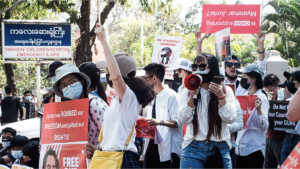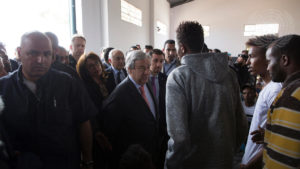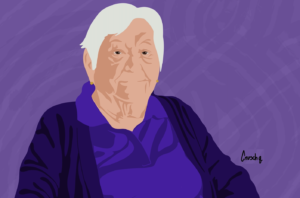SOS Méditerranée is a Search and Rescue (SAR) non-governmental organisation set up by civilians in France and Germany in 2015 when a growing number of people were drowning as they tried to leave inhumane conditions in Libya. It has since grown into one of the biggest grassroots-led organisations in Europe with offices also in Italy and Switzerland, supported by hundreds of volunteers. SOS Méditerranée has saved thousands of lives in the Mediterranean. Caroline Abu Sa’Da is the Director General of SOS Méditerranée Switzerland and spoke to UAI on 11 January 2020, the day that the Ocean Viking departed the port in Marseille fully restocked for a rescue mission in the central Mediterranean again for the first time since July 2020.
United Against Inhumanity (UAI): Thank you Caroline for taking the time to be interviewed by UAI. And congratulations on the release of your ship, the Ocean Viking, on 21 December, after five months of detention in Italy. What exactly happened, and what are now the next steps?
Caroline Abu Sa’Da (CA): Thank you, it’s good to know that the Ocean Viking could finally leave the port in Marseille for a rescue mission again this morning. Almost six months ago now, there was a new interpretation by the Italian authorities regarding safety regulations on board vessels such as the Ocean Viking. They asked us to change quite dramatically the organisation of the ship itself so that the crew would be ready to leave the Ocean Viking in an emergency with rescued people on board. Meetings took place between the authorities and ourselves and we agreed on the plan going forward. We implemented the requested changes, and also received the “rescue” certification by the ship classification society RINA in August, although this was the result of a process that had started already before the Ocean Viking was detained. Different works were carried out on the ship and additions were made, such as new life rafts.
An inspection by the authorities was carried out in late November where 26 of the 29 deficiencies that were listed in July were lifted. The Ocean Viking was granted a single voyage permit to reach the shipyard of Augusta, Sicily, to complete the remaining works required for the release of the ship. On 21 December, after a last inspection by the coastguard, the last three deficiencies were lifted, which was when the ship was freed. We then left to Marseille where we prepared the boat and the crew had to quarantine under strict conditions. After the third PCR COVID-19 test came back negative for all crew members, the crew boarded the ship last Friday. They then waited for good enough weather conditions before leaving the port this morning. The crew will have to do trainings and drills in the next few days whilst heading to the Search and Rescue zone.
UAI: Every year is a difficult year for people trying to cross the Mediterranean. But 2020 seemed an even more challenging year. How did the COVID pandemic impact your work and what else has changed?
CA: The COVID-19 pandemic had a tremendous impact on our work. The last rescue we carried out before the pandemic (had a significant impact in Europe) was in February. When disembarking, the rescued people were already put in quarantine for 14 days; once it was over on the 8 March, we decided that the ship should go back to Marseille. It arrived right before all national borders and the Italian and Maltese ports were declared closed for all ships, not just ours. We then had major discussions with our then-partner MSF (Médecins Sans Frontières); we disagreed on the analysis of the situation, which is why we decided to split and end the partnership. That was a massive consequence of the pandemic.
We then had to stay in Marseille for a few months because the conditions were not right for us to properly carry out our work. The borders were closed, and we were not in a position to supply the ship or otherwise keep our operational policy the way we wanted. We left again end of June/early July for a difficult rotation. We carried out four rescues and the people we rescued were already in a very fragile state; the new set-up of the ship also made it more difficult to be in touch with the rescued people and to appease them. The set-up included a disinfection area for people coming on board of the ship, and all teams wore PPE equipment. We had to wait around 13 days to be given a disembarkation port. The crew couldn’t be in touch with the rescued people as much as they wanted to, and the equipment and masks make circumstances even more difficult. Then, we were quarantined again. So that was a very difficult rotation.
A lot of work went into developing the procedures and adapting protocols to make the ship as safe as possible for the rescued people and the crew. The masks and equipment were also not easy to organize. These were some challenges the team had to handle and will now have to handle again, as these rules are still valid for this rotation. This cost a lot of time at sea and a lot of money; it wasn’t easy to install a disinfection area and to organize the equipment; it was a tremendous challenge, and it’s not over yet. To compare, one rotation in 2017/2018 lasted 3 weeks. Now, a rotation includes at least two weeks of quarantine beforehand; you then do not know how long the rotation will be due to the search for a disembarkation port, and then there are two weeks of quarantine afterwards. So it is much more difficult to organise and plan our work than in the past.
UAI: Why do you think SOS Méditerranée’s specific cause has touched so many people?
CA: I think this cause touches so many people first of all because there is still an awareness for these problems somewhere in our society. The European Union has a difficult time in acting and handling its responsibilities right now, and that’s even an understatement. But people are still asking themselves – are we ok with being part of humankind that allows people to die at sea just to make a point? SOS Méditerranée’s purpose is to save lives at sea and also to remind European States of their responsibilities. And that’s a metaphor for a broader issue – do we consider that solidarity is a minor or a major issue to make us the humanity we want to be? This is part of why I think people feel concerned.
The second reason is that SOS was always conceived and built as a movement of concerned citizens. This is why I liked the idea of this organisation, and left MSF to join SOS. One of the frustrations of working for international NGOs was that we were working in other countries but with sometimes little impact or even a consciousness about what was going on at the border of countries where we came from and lived. It became difficult to turn a blind eye to what was happening at Europe’s borders, as a European citizen. The European Union idea was always extremely important to me – having grandparents who lived during the war, the European dream really meant something when I was growing up. Citizens mobilization is extremely important and one of the triggers for many people to engage themselves with this cause.
UAI: What sort of events or activities do you do for further outreach? And how can citizens everywhere support you?
CA: The COVID-19 pandemic has affected how we carry out our outreach activities. In normal years, there are a lot of events and activities organized by volunteers – they can vary from selling cakes at markets, organizing auctions, debates, panels etc. But essentially, everything that couldn’t be made virtual had to be cancelled in the past year. This was a massive blow. In 2020, the mortality rate in the Central Mediterranean exploded since there were no rescue ships and even merchant ships were prevented from rescuing. But how do you talk about this situation and mobilize people without opportunities to speak and meet people, and when our boat is being detained?
SOS Méditerranée needs support in different ways. Of course, we need money to carry out our operations, which cost 15,000 CHF a day (around 14,000 euros). Most existing funding sources diverted their own funding to COVID-19 related problems, so of course finances are an issue. But it’s also very useful for us when people become members of SOS and join this global movement of volunteers and mobilizers.
UAI: Assuming that your work is also met with skepticism or even criticism from people, how do you respond to that?
CA: There are two different types of negative reactions. We do receive threats, to which we do not respond. We chose to not engage with that for the safety of our team. But we also get a lot of questions on how exactly we operate. We try to be as transparent as possible. There is a lot of information on our website, and it’s important to me that people also do their own homework and research this information that is easy to find. I have worked for SOS for three years now and people still ask the same questions, such as, “are you not doing the work of the smugglers when you rescue people at sea.” A lot of research and academic work has actually been carried out to show that there is no correlation between the presence of rescue NGOs at sea and departures from Libya. So I appreciate it when people look up this kind of information first but it’s also part of our work to explain repeatedly these things.
A lot of people also say that it would be better to increase development activities in the countries of origin of migrants; maybe yes, but this still has to be proven. And in the meantime, for SOS Méditerranée, it is not an option to let people die at sea to make a point. To me, what SOS is doing is very simple: people are leaving Libya where they are in awful conditions in detention centers, where they experience, amongst others, torture and rape. We have evidence for this and we know what it is that they try to escape when they go to sea. And SOS is only trying to save people at sea. We do not engage in larger public debates on migratory policy in Europe or on aid abroad. We are only working on the issue in the Central Mediterranean. People are traveling at sea in dangerous vessels and they need to be rescued.
UAI: How do you coordinate between the four different country offices (Switzerland, France, Germany, Italy), and do you reach out to people living in other countries than these four? Do you have partnerships with other NGOs or platforms across Europe?
CA: Aside from the operational partnerships with MSF and MdM in the past, SOS does not have partnerships with other NGOs. It is already sometimes complex to manage such an operation, being present in four countries. And at this point in time, we do not have the capacity to reach out to people in other countries than those four because SOS is a very small organisation, but of course we would like to do so in the future. It would be wonderful to see more national sections being created elsewhere.
But the work between these four countries works very well; it’s very organic. SOS is one project, with one ship, supported by four offices (Berlin, Geneva, Paris and Milan) that pull staff and resources for one project and operations department based in Marseille.
UAI: SOS Méditerranée in particular seeks to mobilize people and carries out activities such as workshops in schools. What advice would you give to people who see an injustice or want to bring about change?
CA: I also teach, and my main advice is, the first place to get involved is in your own society. Go vote, be involved in public debates where you live. There are injustices everywhere. Even here in Geneva, if I leave my house, I see people sleeping on the street, people affected by COVID in many ways… There is so much to be done. I don’t like when people say “you are so brave” – I am not brave; I am simply acting on the basis of something that triggers me. I had to get involved some way or another. You can join an association, volunteer, start a project, you can vote, even if it’s sometimes hard to believe in the change that comes from it. There are so many good different organisations doing a fantastic job, not just SOS, so linking with them can be a good first step.
UAI: Caroline, many thanks for taking the time to speak to us. We hope more people will join in supporting SOS Méditerranée’s vital life-saving work.
Photo credit © SOS Méditerranée
The Ocean Viking leaving the port of Marseille on 11 January 2021











